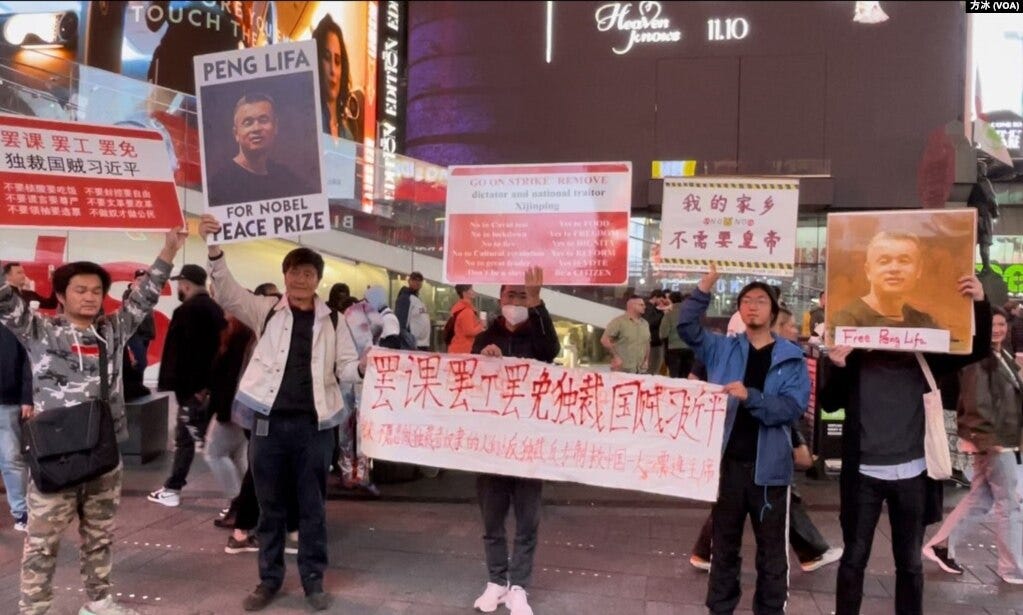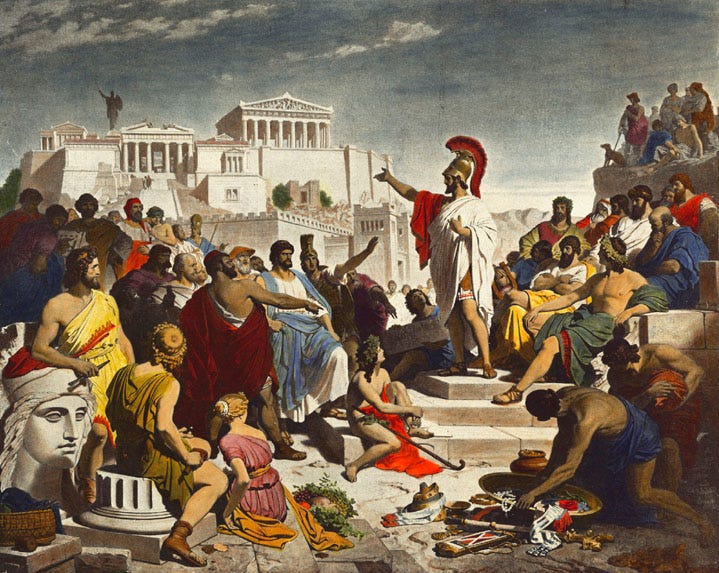Bridge Man
The Courage of Peng Lifa and the Fight for Democracy.
The 13th October marks the third anniversary of an extraordinary cry for democracy from a bridge in central Beijing. The images of a lone figure, unfurling banners in bold red lettering declaring “we want votes,” “citizens not slaves” is etched into my memory. I wish to pay tribute to Peng Lifa, the brave dissident who calmy sat beside his slogans to wait for the heavy hand of authoritarian response.
I watch the internet for his fate. Human Rights watchers have just reported rumours that he has received nine years in prison. His bravery deserves acclaim, and his fate deserves attention. The 13th of October will always be an anniversary for me.
Why has this one act caught my attention? It was calm, intent and very brave to take on the monolithic autocracy of the Chinese Communist Party. That makes it inspirational, and it is never pointless to inspire others. To keep an idea alive and remind others that bravery is inherent in the simplest of protests.
I know little of Peng Lifa’s life but his Wikipedia page is growing every year which promises a legacy. A 48 year old man, with a science background believed that his freedom was worth sacrificing for the idea of Democracy., government by the people, for the people, that could offer rights. It is a powerful notion that will continue to contest with autocracy forever, but it requires the courage of Peng Lifas to prevail.
If you are enfranchised in a democracy, it is easy to take it for granted. It is only when you trace Democracy’s faltering steps that you realize what a wondrous aberration it is, in all its iterations. The intention to give voice to the population is not common, just ask any narcissistic plutocrat. There are not that many historical precedents for democracy. Oligarchy, plutocracy, and autocracy dominate the historical stage.
We can thank Athens for the apellation, if not the application. Nothing good was ever said about Athenian Democracy in many of the ancient sources. Xenophon, Plato and Aristotle were all oligarchs. Thucydides gave voice to the ideal of Democracy in his great version of Pericles’ funeral speech, and in that speech, it was the rule of law rather than the rule of government that mattered
.
It is a wondrous ideal that journeyed through two millennia into the 1948 Universal Declaration of Human Rights (Articles 18–21). Putting it into practice is the challenge.
The best history of Democracy that I have read is ‘Democracy and Its Crisis’ by the philosopher AC Grayling who argues that the problems of Democracy that we bemoan today were all too apparent to the architects of yesterday. How could it be any different given the examples of the Classical World. The Atheninan Democracy succumbed to populism and put Socrates to death for asking too many questions.
The democratic dreams of 14th Century Lollards, 17th Century Levellers or 18th Century American Republicans were realistic about the determination of oligarchy to oppose power sharing and fearful of the mob (ochlocracy) if the plebs were given too much power.
Hence the exquisite balancing of powers and inviolate constitutions to hobble would be tyrants while tepidly extending the franchise. It is no easy thing to craft a democracy. The US founding fathers predicted the dangers of factionalism and thought they could control it with an independent judiciary, but they misjudged the importance of a flexible constitution able to adapt to changing communication. The first attempts are always the hardest, and usually the worst.
Every crisis of Government has resulted in new iterations of Democracy. Some major improvements have been implemented in the 20th Century but to date, not one Constitution has implemented them all. Proportional voting, like that in New Zealand, has weakened the factions. Compulsory retirement can keep the judiciary from becoming too staid. Plebiscites can empower the franchise. Ownership rules strive to control media monopolies. Generals are rotated and retired. Independent corruption commissions to oversee executive powers. Banning political donations to limit the power of the wealthy.
There is still a long way to go before we achieve the ideals of the Universal Declaration on Democracy.
When you hear people bemoaning Democracy, remind them that it is still a work in progress. No matter how many knockbacks, there is a continual urge to march forward toward a rule of law. Peng Lifa pointed the way. One day we will live up to Pericles’ paeon.



